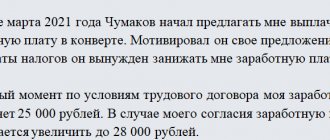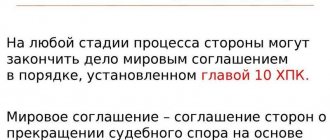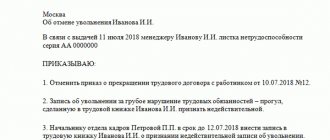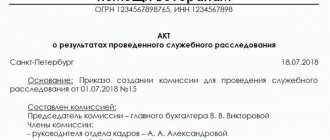How to correctly draw up a cassation appeal to the Supreme Court of the Russian Federation in an arbitration case
cassation appeal to the Supreme Court in an arbitration case free of charge in word format
To review an arbitration case in a third court, a participant in the process prepares an application, adhering to the procedural rules, and indicates:
- the body that considers the cassation appeal is the Supreme Court of the Russian Federation,
- information about the applicant - full name, address, contact information,
- number of the arbitration case in the first instance,
- the decision of the first instance and the resolution on the results of the consideration of the case in the second instance from the point of view of violations of substantive and procedural law,
- the applicant’s demands for cancellation, change of decision or referral for review,
- a list of documents confirming the applicant’s position, including copies of acts of lower authorities certified by the court,
- signature and date.
Note! Information in the text is presented in the form of dry facts. The applicant describes the substance of the claims in as much detail and reasoning as possible in order to simplify the understanding for the court and facilitate preparation for the trial.
The Arbitration Procedure Code of the Russian Federation establishes what documents the applicant provides along with the complaint:
- a receipt for payment of the state fee or an application for deferment, installment plan, benefits,
- evidence of sending a copy of the complaint to the parties,
- copies of acts adopted in previous instances certified by the court,
- a copy of the representative’s power of attorney, other title documents,
- copies of documents by number of sides.
Cassation appeal to the Arbitration Court.
Arbitration Court of the Kirov Region
To the Federal Arbitration Court of ______________________ district through the Arbitration Court of _______
This is important to know: How long does it take to consider a cassation appeal in a criminal case?
Plaintiff: ______________________ _____________________________ (name, address)
Defendant: ___________________ _____________________________ (name, address)
Third party: ________________ _____________________________ (name, address)
to the decision of the Arbitration Court of the Kirov Region dated “___”________ ____
and the decision of the Second Arbitration Court of Appeal dated “___”___________ ____
“__”__________ ____ year The Arbitration Court ______________________ made a decision in this case, according to which the Plaintiff’s claim against the Defendant for the transfer of the buyer’s rights under the real estate purchase and sale agreement was denied.
By the decision of the Second Appeal Arbitration Court ________ dated “__”___________ ____ the decision was left unchanged.
The plaintiff does not agree with the judicial acts adopted in the case and believes that they are subject to cancellation, since the courts, when issuing them, incorrectly applied the norms of substantive law.
In accordance with Part 1 of Art. 250 of the Civil Code of the Russian Federation, when a share in the right of common ownership is sold by one of the co-owners to an outsider, the remaining participants in shared ownership have the preemptive right to purchase the share being sold at the price for which it is sold, and on other equal conditions, except in cases of sale at public auction.
According to Part 3 of Art. 250 of the Civil Code of the Russian Federation, if the sale of a share in common property was carried out in violation of the preemptive right of its purchase by other co-owners, then “any other participant in shared ownership has the right, within three months,” to demand in court the transfer of the rights and obligations of the buyer to him.
“___”_________ ____ year The third party and the Defendant entered into an agreement for the purchase and sale of non-residential premises with a total area of ___ square meters. m, which constituted the common shared property of the Claimant and the Third Party in this case, which violated the Claimant’s pre-emptive right to purchase these premises. The Plaintiff learned about the conclusion of this agreement only during the “___”__________ ____ General Meeting of Shareholders of the Third Party, at which the Plaintiff was present as a shareholder. Until this moment, the Plaintiff did not have any information about the transaction concluded between the Third Party and the Defendant.
Written notification from a Third Party of the intention to sell its share in the common property of non-residential premises to an outsider in violation of clause 2 of Art. 250 of the Civil Code of the Russian Federation was not sent to the Plaintiff.
By virtue of Art. 195 of the Civil Code of the Russian Federation, the period established by law for applying to court for protection of a violated right is the statute of limitations. The Civil Code of the Russian Federation distinguishes the limitation periods into general (3 years - Article 196) and special periods for certain types of claims, which can be either less or more than three years (Article 197). The limitation period begins from the day when the person learned or should have learned about the violation of his right. Exceptions from this rule can only be established by the Civil Code of the Russian Federation or other laws (clause 1 of Article 200 of the Civil Code of the Russian Federation).
Clause 3 art. 250 of the Civil Code of the Russian Federation does not establish a different procedure for calculating the period for the exercise by a co-owner of the preemptive right to acquire a share in the common property. Since the three-month period established by paragraph 3 of Art. 250 of the Civil Code of the Russian Federation determines during what time a participant in shared ownership can apply to the court for protection of his violated right, then such a period fully corresponds to that given in Art. 195 of the Civil Code of the Russian Federation determines the limitation period, which means it refers to special limitation periods and should be subject to the norms of the Civil Code of the Russian Federation on the beginning of the period for applying for judicial protection, that is, from the moment when a person learned or should have learned about a violation of his right .
However, the courts, indicating in judicial acts that the three-month period under Art. 250 of the Civil Code of the Russian Federation is preemptive, they did not analyze the Plaintiff’s arguments that the specified three-month period should be calculated from the day when the Plaintiff learned or should have learned about the violation of his right, and not from the date of the transaction.
Thus, the courts did not apply the rule applicable in this case. In accordance with paragraph 2 of Art. 250 of the Civil Code of the Russian Federation, the seller has the obligation to notify in writing the other participants in the common property of his intention to sell his share to an outsider, indicating the essential terms of the transaction. Only if the co-owners refuse or do not acquire ownership of the real estate within a month, the seller can sell his share to any person. The court, without examining the seller’s compliance with the specified requirement of the law, unreasonably applied clause 20 of the Resolution of the Plenum of the Supreme Arbitration Court of the Russian Federation dated February 25, 1998 No. 8.
When giving explanations, the plenum proceeded from the seller’s compliance with the requirements of paragraph 2 of Art. 250 of the Civil Code of the Russian Federation and the Plaintiff’s (co-owner’s) awareness of the transaction. Since the Plaintiff was aware of the transaction being carried out with an outsider, the plenum indicated that the three-month period for transferring the rights and obligations of the buyer under the contract is preemptive and cannot be restored.
This is important to know: Through which court is a cassation appeal filed under the Code of Civil Procedure of the Russian Federation?
The courts did not examine the case materials at all for the purpose of procedural economy, as indicated in the court decision in the case, which violated Art. Art. 168 and 268 of the Arbitration Procedure Code of the Russian Federation.
overturn the decision of the Arbitration Court ___________________ in case No. ____________ dated “__”_________ ____ and the ruling of the same court dated “__”__________ ____ and send the case for a new trial to the court of first instance.
1. Copies of the decision and resolution.
2. Payment order for payment of state duty.
3. Receipts for sending a copy of the complaint to the Defendant and the Third Party.
4. Power of attorney of the representative.
Representative of the Plaintiff by proxy ___________/________________/
Grounds for filing a cassation appeal to the Supreme Court
The Judicial Collegium of the RF Armed Forces for Civil Cases considers:
- complaints of the parties against judicial acts adopted in the arbitration courts of the constituent entities and courts of appeal,
- complaints against rulings of district arbitration courts and intellectual property rights courts.
The most common reason for appealing to cassation is disappointment in the outcome of the appeal process. But if the dispute was previously considered in the district arbitration court, then in order to appeal to the RF Armed Forces it is necessary to find a significant reason: errors in the application and interpretation of the rules of civil law and the arbitration process, which led to a violation of the rights of the parties, influenced the outcome of the consideration.
Watch the video. Procedure for filing a cassation appeal:
Sample of a supervisory appeal against a decision of an arbitration court
- Arbitration disputes Arbitration law
- Arbitration process
- Differences between appeal and cassation
- Instructions for defense in arbitration proceedings How to win an arbitration court
- Arbitration coming up? What to do
- Familiarization with the case materials
- Collection of legal penalties
- How to write a pre-trial claim
- Sample Settlement Agreement to Arbitration Court
- Application for issuance of a writ of execution
- What copies are evidence?
- Resolution of the Supreme Arbitration Court of the Russian Federation No. 99 of December 25, 2013
- Petition for securing a claim
- In which arbitration court to file a claim?
- Petition to the arbitration court for the inclusion of documents
- Sample response to a statement of claim to the arbitration court
- Reinstatement of the term Petition for restoration of the term
- Restoring the deadline for filing a cassation appeal to the arbitration court Petition to restore the deadline for filing a cassation appeal to the arbitration court
- Deadline for filing a supervisory appeal against an arbitration court decision
- Collection of legal costs in arbitration proceedings Application for collection of legal costs in arbitration proceedings
- Application to the arbitration court for the return of state duty
READ Limitation period for real estate transactions
Submission deadlines
For appealing in the third instance a court decision on an arbitration dispute, a two-month period has been established from the date of production in full of the last act of the judicial authority.
If the deadline for appeal is missed without a valid reason, the application will be left without consideration. But the applicant has the right to submit a reasoned application for restoration of the missed deadline, which the court may or may not consider sufficient to accept the application for proceedings. The application shall indicate the exact reasons, the dates of their occurrence and termination, as well as evidence of their existence.
The law does not establish a list of reasons that the court will consider significant for reinstating the period for appeal. The application is assessed by the court based on the internal conviction in a particular case.
In arbitration proceedings, it is more difficult to justify missing the deadline for appeal than in civil proceedings. This is due to the specifics of the disputes and the participants in the process.
How to file a complaint to the Supreme Court of the Russian Federation in an administrative case?
Supervisory complaint to the arbitration court
The entry into force of a court decision not in your favor is not a reason to stop fighting for your rights. The decision may be reviewed by way of supervisory review.
The content of the article:
ATTENTION : our arbitration lawyer in Yekaterinburg will help you draw up a supervisory complaint to the arbitration court: professionally, on favorable terms and within 24 hours (more details in the video with the terms of the promotion). Call today!
Procedure for filing a cassation appeal
It includes the following steps:
- prepare judicial acts. The Supreme Court of the Russian Federation accepts only copies of decisions, rulings and rulings certified by the court that adopted them. The Supreme Court does not accept judicial acts downloaded from the My Arbitrator system and certified by the party,
- prepare a reasoned statement about violations committed by previous courts that influenced individual judicial acts and the overall outcome of the case,
- sending an application with attached documents to the Supreme Court Collegium for Civil Cases by mail, courier or using the My Arbitrator system,
- consideration of a cassation appeal by a judge who decides the issue of accepting or refusing to initiate proceedings on the application. If the judge considers the complaint insufficiently substantiated or does not comply with the requirements of the APC, he refuses to accept it for proceedings,
- If the judge considers the complaint to be sufficiently substantiated and meets the requirements of the arbitration process, then he issues a ruling on acceptance for proceedings. The judicial panel considers cassation appeals within two months,
- a court hearing is scheduled, at which the panel, the chairman and the parties are present. After studying the case materials and becoming familiar with the position of the parties, the judicial panel deliberates and makes a ruling, which comes into force immediately.
Attention! Our qualified lawyers will assist you free of charge and around the clock on any issues. Find out more here.
A lawyer is ready to answer your question!
Finally, they removed this intermediate stage, when one judge simply returned your cassation appeal with a ruling, indicating that the decision of the trial court and the appeal ruling correspond to the law, and your complaint does not contain significant arguments. Now they are obliged to hold court hearings to consider your cassation appeal and you can attend them.
The cassation instance is intended to correct significant violations of the norms of substantive law or norms of procedural law committed by the courts during the proceedings of a civil case and influencing the outcome of the case, in cases where without their elimination it is impossible to restore and protect the violated rights, freedoms and legitimate interests, as well as the protected law of public interests.
This is important to know: Sample cassation appeal under the Code of Administrative Offenses of the Russian Federation
Documents confirming violation of substantive (and (or) procedural) law that influenced the outcome of the administrative case.
The relevant candidacy is presented directly by the President of the State. Despite the scale of the position and the subordination of the entire judicial system, the powers of the official are clearly regulated.
Documents confirming violation of substantive (and (or) procedural) law that influenced the outcome of the administrative case.
A person who believes that his right to trial within a reasonable time has been violated has the right to file a cassation appeal with the Judicial Collegium of the Supreme Court of the Russian Federation, which may also set out demands for awarding him compensation.
Reasons for refusal to accept a document
The main organizational reasons for refusal to accept a complaint in the third instance:
- incorrect drafting of the complaint by the applicant that does not comply with the norms of procedural law,
- missing the two-month deadline for appealing a judicial act,
- erroneous determination of jurisdiction when filing an application,
- absence of a power of attorney confirming the applicant’s authority.
Semantic reasons for refusal to consider a cassation appeal:
- the reasons indicated by the applicant are not significant for reviewing the case in cassation,
- the statement is not supported by evidence and is correlated with the case materials.
The documents attached to the complaint, like the complaint itself, are not returned to the applicant.
When making any decision regarding the complaint, the court makes a determination and sends it to the parties.
When preparing a complaint, it is important that the lawyer is aware of responsibility and strives to describe the violations and requirements in as much detail as possible and support them with convincing evidence.
Cassation appeal to the Supreme Court of the Russian Federation in a civil case.
Grounds for canceling or changing court decisions in the manner of supervision
Based on the results of consideration of the supervisory complaint, previously made decisions may be canceled if one and/or several violations are confirmed:
- human rights and freedoms are violated. Respect for human rights and freedoms guaranteed by the Constitution and in accordance with international standards is the highest value and the basis of human rights protection. Violated rights can be personal (the right to life, integrity, privacy of correspondence, freedom of creativity and others), public-political (freedom of assembly, voting rights), social (maternity protection, health protection), economic (business activities, the right to private property).
- the rights and interests of an indefinite number of persons or other public interests are violated . Public interest refers to the interests of an indefinite number of persons, for example, environmental protection, ensuring the health of citizens, provided that all persons whose rights are violated cannot be identified and brought as a party in a court hearing.
- uniformity in the application and interpretation of legal norms by courts has been violated . That is, when making the decision appealed in the supervisory procedure, such rules of law were applied or such an interpretation of the rules was applied that contradicts the explanations of the Plenum of the Armed Forces of the Russian Federation.
HEALTHY:
Terms of consideration
As a general rule, the Supreme Court considers cassation appeals within two months. However, if the court considers it necessary to request the case materials from the court of first instance, the period for consideration is increased to three months. In addition to three months, the delivery time for case materials from the regional arbitration court to the RF Armed Forces is added.
At a certain level of complexity of the case, the chairman of the court has the right to extend the consideration for an additional two-month period. In general, from the moment you submit your application until a decision is made on it, it will take approximately five months.
Deadline for filing a supervisory complaint under the Arbitration Procedure Code of the Russian Federation
Expert opinion
Orlov Igor Severinovich
Practicing lawyer with 7 years of experience. Specialization: criminal law. Law teacher.
The period is strictly limited by law. A complaint against a court decision in the manner of supervision is possible within three months (3 months) from the date such a decision (ruling, resolution) enters into force.
If this deadline is missed, an exception is possible, giving the right to apply for restoration of the deadline if a person who has exceptional and valid reasons for missing the deadline filed a petition before the expiration of the six-month period from the date the court decision entered into force or from the day when the person learned or should have learned that his rights were violated.
USEFUL : read about the issue of restoring the deadline for filing a complaint using the link, and also watch a video with additional advice from a lawyer
Arbitration decision
The Supreme Court makes one of the following decisions regarding the cassation appeal:
- refuse satisfaction and leave the court decision unchanged,
- satisfy the application.
When satisfying the complaint, the Supreme Court of the Russian Federation also determines the further fate of the arbitration case:
- full or partial reversal of the decision,
- issuing an additional ruling on the case,
- referral for review in the first instance,
- completion of the arbitration process.
Watch the video. How to cancel a court decision that has entered into legal force:









